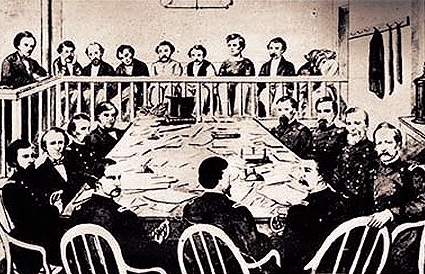Saturday, June 30, 2012
Tuesday, June 26, 2012
Today in the Lincoln Conspiracy: June 26
Two days after Gen. Robert E. Lee surrendered, President Lincoln spoke to a crowd of well-wishers at the White House. During his remarks, Lincoln strongly made the case in favor of equal voting rights for newly freed slaves in the Southern states. Among those listening was John Wilkes Booth. He was so enraged by Lincoln's words that he declared it was the last speech the president would ever make. But it wasn't the first time Lincoln had addressed the issue. That had happened almost eight years earlier.On June 26, 1857, Lincoln gave a speech in Springfield, Illinois harshly critical of the Supreme Court's Dred Scott decision. Specifically, he was responding to a speech made at the same venue two weeks earlier by Stephen A. Douglas, the Democratic U.S. Senator from Illinois. Douglas had endorsed the court's ruling that -- in essence -- African Americans had no rights guaranteed to them by the Constitution. Lincoln presented a spirited counter-argument, by turns legal, philosophical and moral. He concluded:
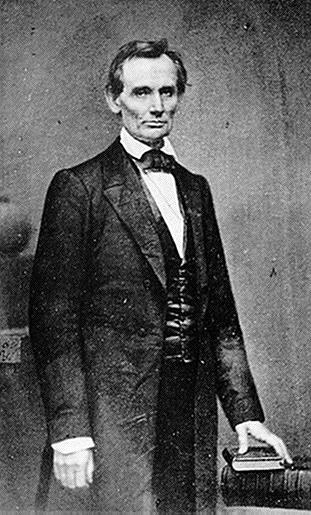 |
| Abraham Lincoln, 1860 |
The next year, Illinois Republicans nominated Lincoln to challenge Douglas for re-election. He lost. Two years after that, Douglas and Lincoln faced off for the presidency. Lincoln won.
Sunday, June 17, 2012
Today in the Lincoln Conspiracy: June 18
 |
| Abraham Lincoln, attorney at law |
Saturday, June 16, 2012
Today in the Lincoln Conspiracy: June 16
 |
| Michael O'Laughlen |
Thursday, June 14, 2012
Today in the Lincoln Conspiracy: June 14
The question of Lewis Thornton Powell's sanity consumed two days of testimony at the Lincoln conspiracy trial. On June 14, 1865, Powell again submitted to an examination -- this time by the Surgeon-General of the United States Army, along with the previous witnesses, Dr. James C. Hall and Dr. Basil Norris, an Army surgeon. Their verdict was unanimous. |
| Lewis Thornton Powell |
Wednesday, June 13, 2012
Today in the Lincoln Conspiracy: June 13
Most of what we know about conspirator Lewis Powell comes to us from testimony at the Lincoln assassination conspiracy trial. The defense argued that he was insane and presented the testimony of two doctors to support the claim. |
| Lewis Powell at the Washington Navy Yard, 1865 |
Hall testified that Powell had a sluggish memory and that he was slow to respond to simple questions. The doctor told the court, "His mind is naturally dull and feeble, and, I presume, has not been cultivated by education." Hall also asked Powell if a crime -- like the one with which he was charged -- could ever be justified morally. Powell's response: "...in war a person was entitled to take life." The doctor concluded, based on that answer, that there were reasonable grounds for a suspicion of insanity. Under cross-examination, Hall admitted he was not prepared to declare Powell was, in fact, insane. He protested that such a conclusion could only be based upon numerous examinations of the subject. He said his single examination was, by necessity, too cursory to reach such a judgment.
The examination was cursory indeed. During the course of his interview, Hall asked Powell for his mother's maiden name. Powell said he couldn't remember. Apparently, the doctor never asked the prisoner for his own name. Throughout his testimony, Hall referred to him as "Payne", the alias Powell had adopted in order to enter war-time Washington.
Tuesday, June 12, 2012
Today in the Lincoln Conspiracy: June 12
 |
| Ford's Theatre |
On June 12, 1865, Ford's employee Louis J. Carland appeared before Lincoln conspiracy tribunal. He testified that, on the night of the assassination, he went in search of Ned Spangler, the theater employee charged as a conspirator. Carland went to the room of another theater hand, Jacob Ritterspaugh, to ask where Spangler had gotten off to. Ritterspaugh was quite shaken, according to Carland. The man said he had been backstage when President Lincoln was shot. He had seen John Wilkes Booth dash across the stage and out the back door. Ritterspaugh said he pointed out the fleeing figure to Spangler and said that it was Booth.
According to Carland, Spangler slapped Ritterspaugh across the mouth. Then he thundered, “You don’t know who it is; it may be Mr. Booth, or it may be somebody else.”
Monday, June 11, 2012
The Plan: John Wilkes Booth and the Plot to Destroy the U.S. Government
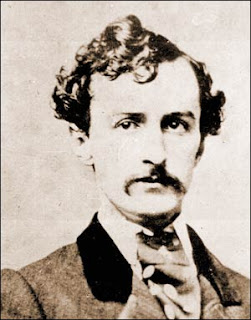 |
| John Wilkes Booth |
But Booth was not acting alone.
At the moment he entered the State Box at Ford's, he was convinced his fellow conspirators were taking coordinated actions that would paralyze -- perhaps even destroy -- the government of the United States. Booth was a hothead, to be sure, and an egotist. He imagined every state in the Confederacy would raise a statue of him after he struck his blow for Southern freedom. But he wasn't irrational. His actions were motivated by cold calculation and desperation, not madness.
 |
| Lewis Powell |
The plan was brilliant in its audacity. If successful, it would leave the United States government paralyzed, without its president, vice president, senior cabinet officer and general-in-charge of its army. Their deaths would precipitate a full-blown constitutional crisis that would take days, if not weeks, to resolve. Booth and his conspirators could use the confusion to mask their getaway. At least, that was the thinking behind the plan.
 |
| George Atzerodt |
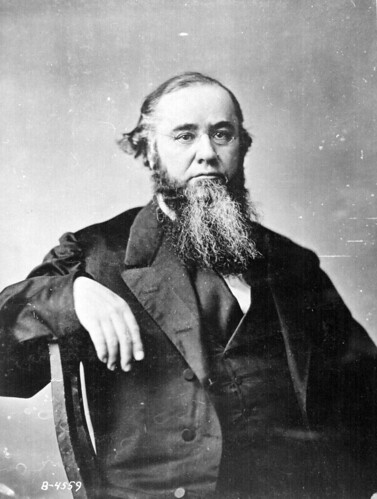 |
| Secretary of War Edwin Stanton |
Sunday, June 10, 2012
Today in the Lincoln Conspiracy: June 10
 |
| John Harrison Surratt Junior |
Following the failed attempt to kidnap President Lincoln in March 1865, conspirator John Surratt fled Washington. He made his way to New York, Canada, England and finally to Rome, where he joined the papal army. In late 1866, Surratt was arrested in Alexandria, Egypt and extradited to the United States.
On June 10, 1867, Surratt went on trial in Maryland, charged with murdering Lincoln. Unlike his mother Mary, he was judged by a civilian court. The trial ended in a hung jury.
Saturday, June 9, 2012
Today in the Lincoln Conspiracy: June 9
Following the assassination of President Lincoln, Ford's Theatre was closed and turned over to the U.S. government. It was used as office space for various federal agencies, including the Surgeon General and the War Department.On June 9, 1893, the front section of the building collapsed, killing 22 War Department employees and injuring 68 more. Despite being the scene of two deadly catastrophes, Ford's Theatre remained in government use until 1911. It was fully restored and re-opened as a theater in January of 1976.
Friday, June 8, 2012
Today in the Lincoln Conspiracy: June 8
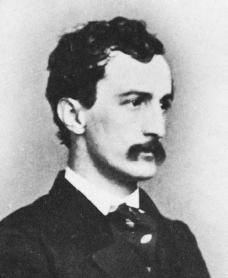 |
| John Wilkes Booth |
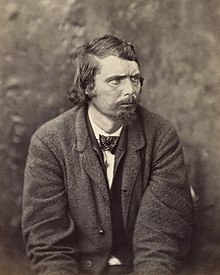 |
| George Atzerodt |
On June 8, 1865, Norton told the military tribunal that the assassination of the president -- coupled with the attack on the Secretary of State and the bungled scheme to kill the Vice President -- brought that conversation back to his mind. So what were Booth and Atzerodt talking about?
In 1857, a horrifying illness swept through the guests at the National Hotel -- twice.
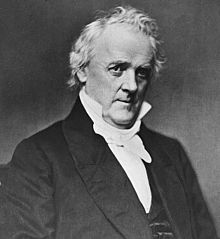 |
| President James Buchanan |
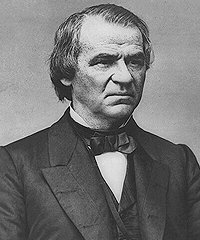 |
| Vice President Andrew Johnson |
Thursday, June 7, 2012
Today in the Lincoln Conspiracy: June 7
During the Lincoln assassination conspiracy trial, prosecutors went to great lengths to paint Mary Surratt as an active member of the plot to kill the president. Witness after witness described the fervid pro-Confederacy sentiments of Mrs. Surratt and members of her family. They painted the Surratt boardinghouse in Washington as a nest of murderous vipers bent on destroying the United States.Mrs. Surratt had three children. Her elder son Isaac was a soldier in the Confederate Army. Her younger son John was a Confederate spy who had schemed with John Wilkes Booth since the earliest days of the conspiracy. Her middle child, Elizabeth Susanna (known as Anna), lived at the boardinghouse from November of 1864 until her mother's arrest.
 |
| Elizabeth Susanna "Anna" Surrattv |
Anna Surratt also admitted she owned two photographs of John Wilkes Booth, whom she had met through her brother John. She kept them hidden on the back of a painting given to her by Weichmann. Anna told the tribunal her brother was furious when she bought them and demanded she tear them up. She insisted that her acquaintance with Booth was casual, limited to a few brief encounters at the boardinghouse.
On June 7, 1865, a defense lawyer showed Anna a card bearing the state seal of Virginia. She admitted she owned the card. She testified a woman had given it to her two and a half years earlier. Printed on the card was the state's motto, "Sic semper tyranis" -- the very words Booth shouted as he fled from Ford's Theatre the night he shot Abraham Lincoln.
Wednesday, June 6, 2012
Today in the Lincoln Conspiracy: June 6
What did Dr. Samuel Mudd know and when did he know it? For a century and a half, that question had been hotly debated among Lincoln conspiracy scholars. An old friend of the doctor's made a damning assertion about Mudd's knowledge at the Lincoln conspiracy trial.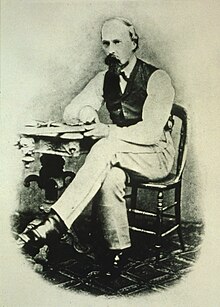 |
| Dr. Samuel Mudd |
On June 6, 1865, Thomas faced blistering cross examination from the defense. He denied that he had tried to claim a reward for providing information that led to Mudd's arrest. He rejected a defense contention that he had asked soldiers to sign certificates that he had passed along the details of his conversation with Mudd before the doctor's arrest so he could collect $10,000 -- or even $25,000. Under repeated questioning, however, Thomas did admit he told two soldiers they should sign certificates to that effect so he could cash in. But, Thomas insisted, he was just joking.
Tuesday, June 5, 2012
Today in the Lincoln Conspiracy: June 5
The chief witness against the Lincoln conspirators was Louis J. Weichmann, a clerk at the War Department. |
| Louis J. Weichmann, witness for the prosecution |
He had attended seminary with John Surratt Jr. and rented a room at Mary Surratt's boardinghouse in Washington. He testified that the Surratt house was the hub of the conspiracy and most of its members had attended meetings there. Weichmann himself had been detained for a time following President Lincoln's assassination because of his close ties to the Surratts.
After his testimony and the execution of the conspirators, Weichmann moved to Anderson, Indiana where he died on June 5, 1902.
Monday, June 4, 2012
Ebook links to ITunes, the Kindle Store and Kobo are on your right.
Sunday, June 3, 2012
Today in the Lincoln Conspiracy: June 3
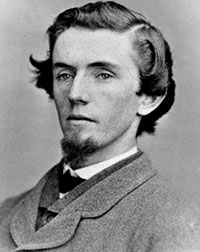 |
| John H. Surratt Jr. |
On June 3, 1865, a tailor named David C. Reed testified that he had seen Surratt outside the National Hotel at 2:30 in the afternoon on April 14th. The National was, of course, where John Wilkes Booth was living at the time. Surratt maintained he was nowhere near Washington when Lincoln was shot, and had no contact with Booth after April 3rd.
Reed would repeat his testimony nearly two years later when Surratt stood trial before a civilian court. He insisted he immediately recognized Surratt. Reed claimed he had known Surratt since he was a child. He described Surratt's clothes and hair cut, said he was 30 to 35 years old and clean-shaven. In fact, on April 14, 1865, Surratt had just turned 21 and wore a beard.
Saturday, June 2, 2012
Mr. Lincoln's Getaway
It's hard to imagine the president of the United States traveling freely around Washington. But Abraham Lincoln did, even though he knew he was a target for any Confederate sympathizer in the city. And he didn't think twice about traveling to the outer reaches of the Federal District, often ditching his unit of cavalry bodyguards along the way. |
| The Lincolns' cottage at the Soldier's Home |
The president would then commute to the White House. If Mary was with him, they'd ride in a buggy. If he was alone, he'd usually just hop on a horse and ride into town. During those months, Lincoln kept bankers' hours. He'd arrive at the Executive Mansion at nine or ten in the morning and head back to the Soldier's Home by 4:00 PM. He followed that routine for weeks at a time, traveling -- unprotected, for the most part -- across Washington.
The Lincolns also made it a habit to visit the military hospitals that sprouted all around Washington during the war. The First Lady was a regular visitor to the three dozen facilities caring for the war wounded. She would read to the patients, pass out fresh fruit and flowers. And the president frequently popped in, unannounced, to spend time with the casualties, the nurses, the doctors and the staffs. The Lincolns would often plan their afternoon rides around the city so they could stop at one or more hospitals along the way.
 |
| Campbell General Hospital, Harper's Weekly, 1861 |
John Wilkes Booth didn't know that, however. He and his co-conspirators laid in wait on 7th Street, not far from the hospital. They planned to abduct Lincoln and spirit him off to Richmond. But the president didn't show up.
Today in the Lincoln Conspiracy: June 2
Prosecutors at the trial of the Lincoln conspirators presented a great deal of testimony about the pro-Confederacy sentiments of the accused. On June 2, 1865, E.L. Smoot told the military tribunal that Mary Surratt's brother, J.Z. Jenkins, was "an enemy to the Government during the struggle". And he recounted a conversation he had with the bar-tender at the Surratt tavern in Maryland on the day President Lincoln died. |
| John H. Surratt Jr. |
Friday, June 1, 2012
"The History of the Nation Was Made There"
In 1865, the most fashionable address in Washington, D.C. was on the corner of Pennsylvania Avenue and 6th Street, NW. There stood the center of Capitol society -- the National Hotel. It had been the hub of Washington's political and social wheel since it opened in 1827. The original owner, John Gadsby, started small. He first built a collection of bungalows around a central courtyard. Then he expanded the building until, by 1857, it stood as an imposing five-story edifice just four blocks from the U.S. Capitol and ten blocks from the White House.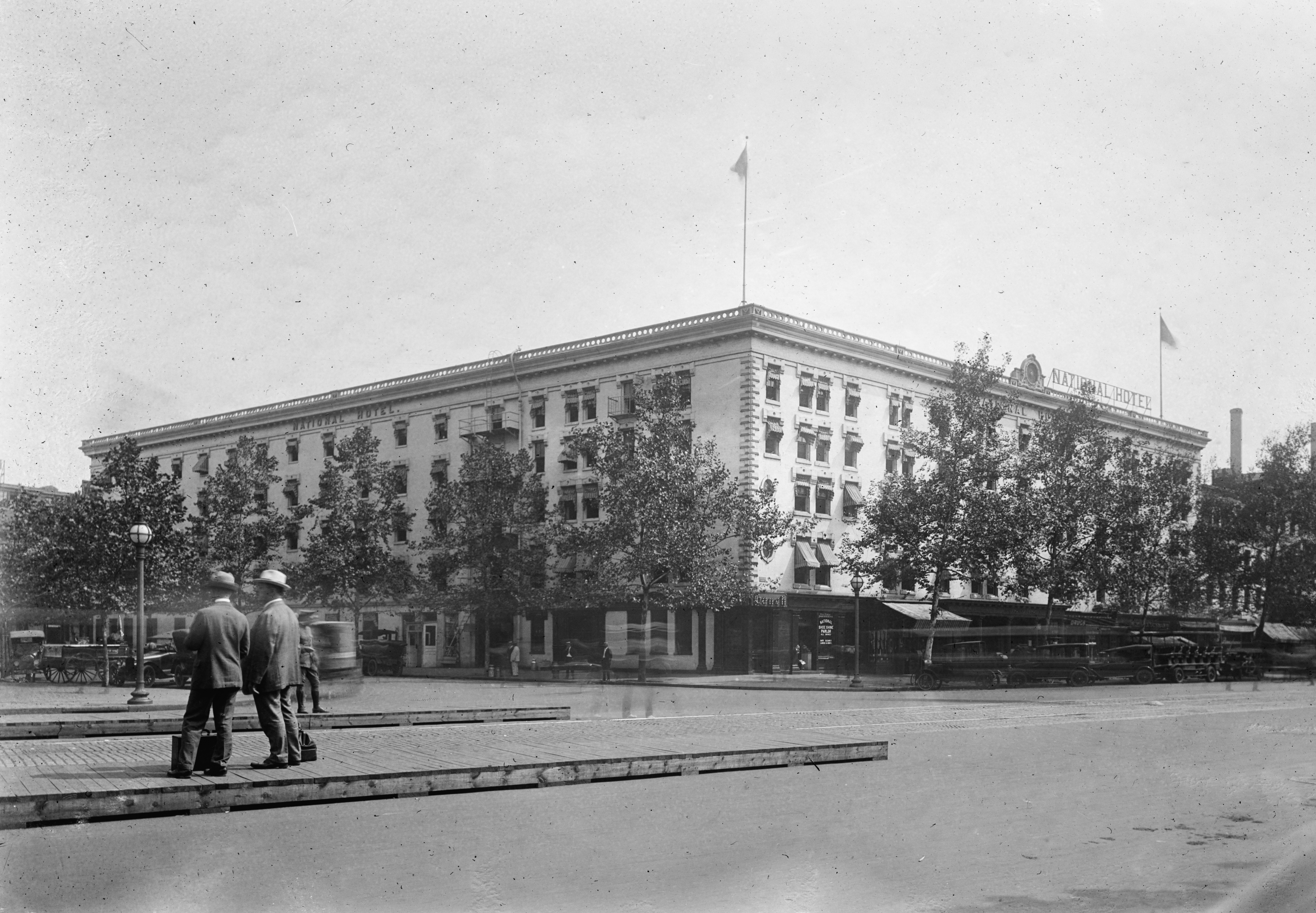 |
| The National Hotel |
When the English writer Charles Dickens visited Washington in 1842, he stayed at the National. The great orator Henry Clay, who served as Speaker of the House (on three different occasions), U.S. Senator and Secretary of State, lived at the National for many years. He died there in room 116. Clay's nemesis Andrew Jackson stayed there too, as did President Polk. Abraham Lincoln was also a guest at the hotel and held his inauguration banquet there.
In January of 1857. President-elect James Buchanan checked into the National. During his stay, several of the guests became violently ill. Some of them died. When Buchanan left Washington, the illnesses stopped. He checked back into the National just before his inauguration. Once again, a mysterious illness swept through the hotel. Buchanan heeded the advice of the locals and took his meals elsewhere. After he moved into the White House, the illness again vanished. Was someone trying to poison the new president? No one knows. The cause of the outbreaks was never determined (though a foul sewer opening in one corner of the building was considered a likely culprit).
During the Civil War, the office of the military's official news censor was in the National Hotel. Senator John P. Hale of New Hampshire lived there with his family, including daughter Lucy. In Room 228, Lucy's beau, John Wilkes Booth, plotted to bring down the United States government.
By all accounts, the National served its guest on a grand scale. Its dining room was legendary for sumptuous dinners. The hotel hosted balls, banquets and meetings of all sorts. The Washington Post reported in 1930, “Apart from the Capitol and the White House, there is no building in this city so historic as this. For more than half a century the history of the Nation was made there.” But times change.
By the early 20th Century, the National was having trouble competing with its more contemporary and lavish neighbors, the Raleigh and the Willard. In 1921, fire heavily damaged the National. It never recovered. The District of Columbia government bought the building in 1929, closed it in 1931 and tore it down 11 years later.
Subscribe to:
Posts (Atom)

